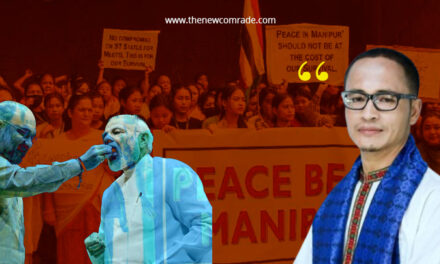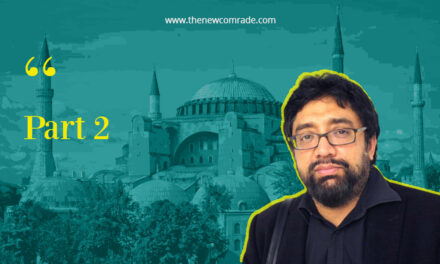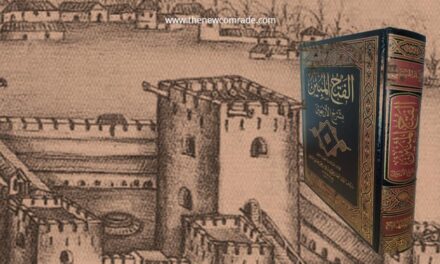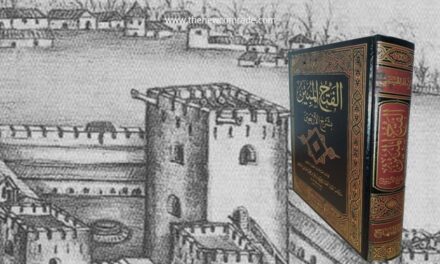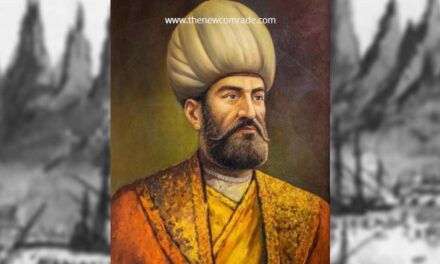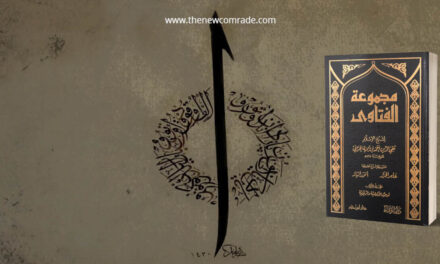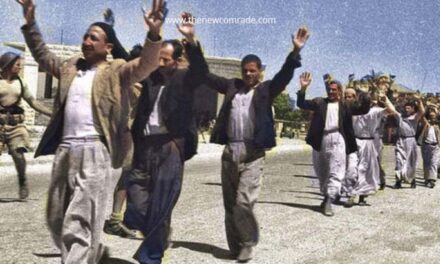
Muslim Experiences in Resisting Imperialism and Fascism (part two)

Find first part of the article here.
“Million-Martyrs lands”
Algeria used to be an ‘Eyalet’1 of Ottoman dominion. At the beginning of the period covered in our scope, the United States had become independent. Western ships used to sail through the Mediterranean, flying their flags, and paid fees to the local government for the same. When US ships began flying their flags and not paying their costs, they were not allowed to sail further from Algiers. In 1210 AH/1795 CE, George Washington signed an agreement with Bekler Hasan, the governor of Algiers, which remains the only one in a foreign language signed by the US. Then there were a series of wars called the Tripoli war (1216-1220 AH/ 1801-1805 CE), the Algiers war (1230 AH/1815 CE), and then the bombardment of Algiers (1231 AH/1816 CE). The French occupation was initiated by the first refusal to settle dues owed to the merchants of Algiers and then to attack the governor Husayn Pasha when he took up the matter with them in 1246 AH/1830 CE.
French forces fought a couple of battles with forces composed of regular Ottoman troops and local volunteers. In a matter of a month and a half, the defeat was complete. Husayn Pasha was exiled to Alexandria, and his troops, led by Aga Ibrahim, too, were deported to other places in Ottoman dominion. This defeat was followed by a series of popular uprisings and revolts, beginning with the one of Abdalqader al Hasani (also known as ‚al Jaza’iri). France had profound political transitions in this time- from monarchy to constitutional monarchy; however, there was no difference in their stances on imperialism. The invasion continued unabated. When the French began moving beyond Algiers, Muhyaddin al Hasani- Abdalqadir’s father- rallied various tribes to fight the French troops in their native region of Oran (Wahran). Abdalqadir was made their leader. Their military operations forced the French to placate the people of those regions, and, for the time being, they allowed Abdalqader to run an independent state to the west of Algiers by means of the De Michel Pact (1250 AH / 1834 CE). Expectedly, France violated the pact and resumed hostilities. Repeated setbacks made the French make the Tafna Pact (1253 AH/1837 CE) again. Furthermore, they breached it and declared war in 1255 AH/1839 CE. The war ended in the defeat of Muslims (Muharram 1264 AH/December 1847 CE). He spent about five years in French captivity, again, contrary to the terms of surrender. He was exiled to live in Dama. However, it is a tragedy that he accepted French pensions and awards and disowned his own path in the early 1280s AH/mid-1860s CE. This made him an unconventionally sympathized figure in the West.
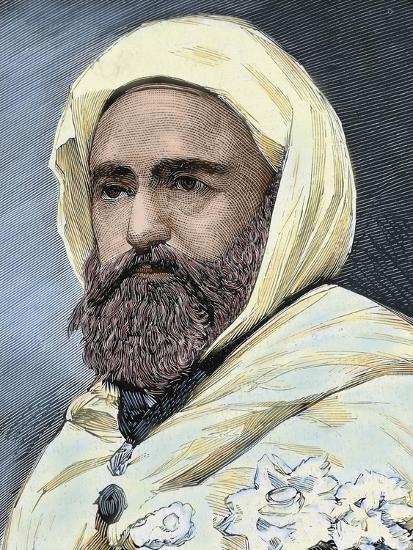
There was, however, no halt to the resistance. Revolts kept erupting one after the other. Some prominent revolutions were as follows: Sharif Ahmed Bey and Ali Ben Isa- led the resistance of Constantine (1253-264 AH/1837-1848 CE), tribes of the Kabyle region (1253-1261 AH/1837-1845 CE), Ahmed Bu Zayan- led a revolt at Biskra (1264-1266 AH/1848-1849 CE), Sharif Mohammed- led a revolution in the interior (1268-1271 AH/1852-1854 CE), Sharif Mohammed al Amjad ‚Bu Baghlah‛ – led revolt of tribes in Kabyle region (1267-1274 AH/1851-1857 CE), Ould Sidi Shaykh– led revolt south of Oran region (1281 ~ 1284 AH/1864-1867 CE), Mohammed al Maqrani led– a revolt in the eastern Kabyle frontiers (1288-1289 AH/1871-1872 CE), Bu Merzaq– led the revolt of tribes in Constantine (1288 AH/1871 CE), Mohammed Bu ‘Amamah – led a revolution in the western region (1298-1301 AH/1881-1883 CE), the revolt of Bani Shaqran tribes at Mascara (Ma’askar; 1330-1332 AH/1912-1914 CE), Tuareg tribes’ revolt (1335-1336 AH/1916-1917 CE).
At some point in time, the population of Algeria had reduced due to the toll of these revolts and French ‘pacification’. Settlers were brought in from France. The French language was imposed. Mosques were more or less closed down. From 1308 AH / 1890 CE, a few locals began to be taught at colonial schools as part of the ‘civilizing mission’ and, obviously, in preparation for future socio-political transitions. Locals were taxed high. Many locals were coerced into military conscription.
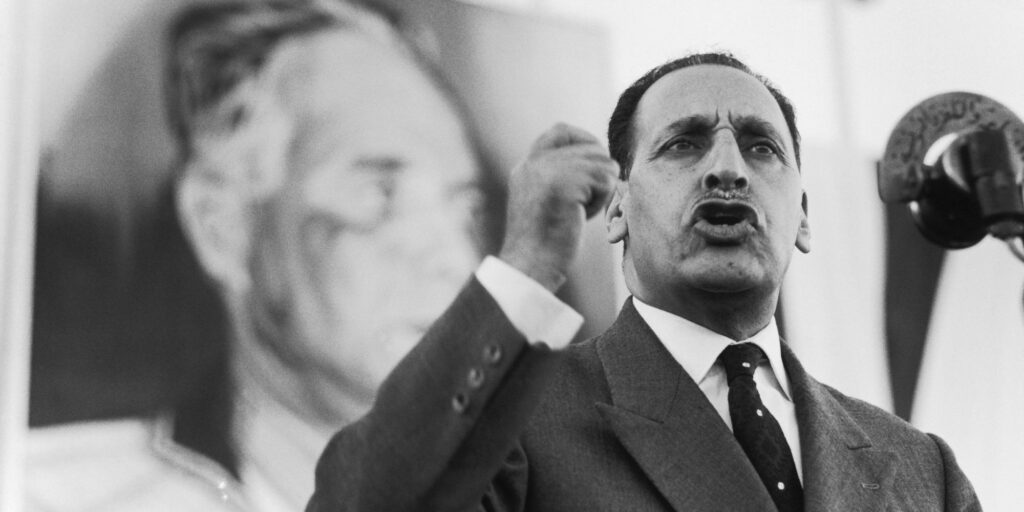
With the outbreak of World War II, France passed under Nazi control. This brought Anglo-American troops to Algeria to fight “Vichy France” troops (Operation Torch, Dhi’l Qa’dah 1361 AH / November 1942 CE) and handed it over to “Free France” troops. A legislative assembly was created to micro-manage the situation. The modern era of resistance began with the founding of the “North Africa Star” party by Ahmed Masali Haj in 1345 AH / 1926 CE. Gradually, it developed into the Liberation Front (FLN). A bloody war of independence ensued from 1374 AH / 1954 CE to last seven and half years. As per French estimates, over 3,50,000 deaths resulted. The French policies of de-Arabization, De-Islamization, and annexation to Europe were resisted by the leadership of the Association of Muslim Religious Scholars (Jam’iyat ‘Olama al Muslimin), formed in 1350 AH / 1931 CE in the pioneering of Abdelhamid bin Badis and Bashir al Ibrahimi. They organized multi-faceted programs amongst Algerians, residents, and abroad to maintain the Arab Muslim character of Algeria. A provisional government was formed in Cairo, led by Ferhat Abbas and Ben Yousef Ben Khadah. Upon being declared independence, however, these figures were sidelined by imperialist clients like Ahmed Ben Bellah and Houari Bou Medine in the leadership of FLN and placed under house arrest. Algeria went into a period of authoritarianism and oligarchy under the label of FLN. Chadli Ben Jedid opened up for democratic elections in 1992, and the winners were denied by the French–client military establishment to come to power. Over 25,000 lives were lost in the civil war that ensued. Though the state repression subsided, the military establishment still ruled high. Ali Belhaj- the leader, poised to become the Prime minister after those elections- is often put under house arrest.
Afghani’s Activities
Sayed Mohammed al Husayni, better known as Jamaluddin al-Afghani, is an iconic figure to be given a place in the series of encountering imperialism. Born around 1254 AH/1839 CE in As’adabad, capital of Kunar Province of present-day Afghanistan, he was a figure of a rare genre, divinely gifted to open the eyes of the community. He was first a soldier and then a political counsellor for the Amir of Afghanistan, Dost Mohammed Khan (reign 1259 ~ 1279 AH / 1843 ~ 1863 CE) and then his son Azam Khan (reign 1283-1285 AH/1867-1868 CE). He encouraged him to oppose the English. The English ignited a power struggle, and they pitched his brother Sher Ali Khan against him. He, in turn, used the money he got from the English to buy the allegiance of numerous tribal heads. Azam Khan was defeated, and he fled. Eventually, Afghani, too, had to leave the place. English later turned against Sher Ali Khan in the Second Anglo-Afghan war in 1295 AH / 1878 CE, and he was to flee.
The English installed his son Yaqub Khan, and he made the Gandamak Pact the following year. Later, the English deposed him, and his cousin Abdurrahman Khan was installed. This was a significant experience for Afghanis on the slyness and crookedness of the English. Afghani later turned to India (1287 AH/1870 CE), and the English government deported him to Egypt. After performing Haj, he headed to Istanbul, where Sultan Abdulaziz welcomed him. There he advocated for educational reforms drawing the jealousy of Grand Mufti Hasan Fahmi. He then left for Cairo (1871 CE), where Khedive Ismail Pasha reigned at the time. His enlightening lectures charged the atmosphere in various domains- political, social, educational, etc. He established the ‘Urwat al Wuthqa Society’, which had a curriculum for members, encouraging reading and discussion2. He was later deported, at the behest of the English, by Khedive Tawfiq Pasha to India (Ramadan 1296 AH / August 1879 CE).
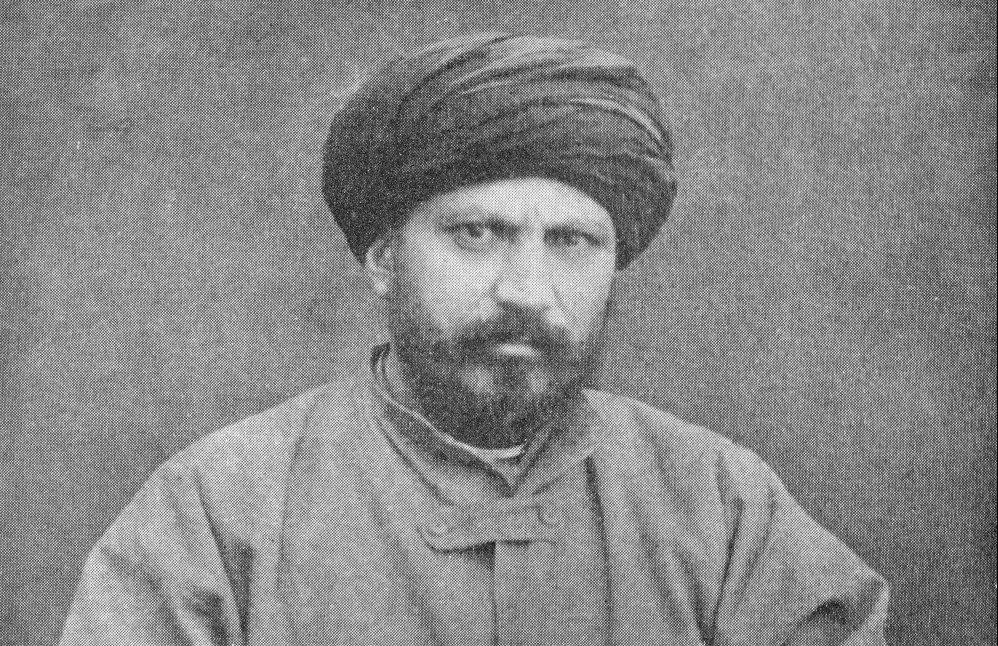
His disciples led an unsuccessful revolt in Egypt under Orabi Pasha, Mahmud Fahmi, Mahmud Sami Baroudi, Abdallah Nadim, etc. (1296-1299 AH/1879-1882 CE). Alexandria was bombarded, and the English troops formally invaded Egypt. Orabi Pasha and Mahmud Sami Baroudi were deported to Ceylon. Orabi Pasha, in this period, established the Muslim Educational Society and the first Muslim school, Zahira School in Colombo (1309AH/1891 CE), along with Siddi Labba, against the backdrop of state-sponsored Christian proselytise movement of the English government there.
While in India, Afghani wrote against the pro-English stances of the Aligarh school. Upon the defeat of the revolt in Egypt, he was deported from India. This time he headed to Paris. His disciple, Mohammed Abduh, joined him and established the ‘Urwat al Wuthqa’ magazine. The first issue came out on 15th JamadaI Awwal 1301 AH/13th March 1884 CE 2. The effect of this magazine was electrifying –various uprisings broke out against imperialists throughout the Muslim World. After 18 issues within a year, the magazine was closed. In his period in Europe, he took time to refute the allegations raised upon Islam by Joseph Ernst Renan.

After some time of lobbying for Muslims in various West European capitals, he could be found preaching and exhorting in Tehran. He was soon deported from Qajar, Iran, to Ottoman Basrah. His exposure to the misrule of Shah Nasiruddin led to widespread unrest against him & him getting killed & eventually the Constitution revolution (1323 ~ 1329 AH/1905-1911 CE) against his successor Muzaffaraddin Shah. From 1310 AH/1892 CE, he stayed in Istanbul, advising Sultan Abdelhamid and the commoners on the political dilemmas of the Muslim World until he passed away on 5th Shawwal 1314 AH/ \9th March 1897. His struggle and steadfastness have made the enemies cast suspicions & propagate falsehoods about his origin, personality and activities, which could be seen in contrast to Abdulkadir al Hasani al Jaza’iri.
(to be continued…)
End Notes
- Eyalets , also known as beylerbeyliks or pashaliks, were a primary administrative division of the Ottoman Empire.
- Emarah Mohammed, جمال الدين االفغاني بين حقائق التاريخ و ااكذيب لويس عوض
Author Profile

Munawwar Kavungal
Political analyst, Freelance translator.

